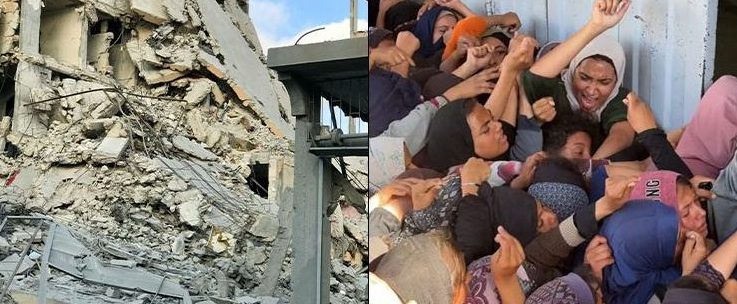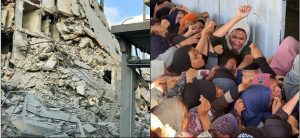Gaza’s Cash Crisis Deepens as Banks Reopen Without Funds
4 min read
Despite the reopening of the Bank of Palestine in Deir al-Balah, residents continue to face crippling cash shortages as Gaza’s liquidity crisis worsens amid the ongoing war with Israel.
The reopening of banks in Gaza has brought little relief to residents desperate to access their money, as the territory’s two-year war with Israel continues to paralyze financial operations and deepen economic despair.
On Tuesday, dozens of Palestinians gathered outside the Bank of Palestine in Deir al-Balah, hoping to withdraw cash after months of closure. But after hours of waiting, most left empty-handed.
“I came at dawn thinking I’d finally get my salary,” said Raed Saleh, displaced from Jabaliya refugee camp in northern Gaza. “After waiting for 12 hours, they told us there’s no money the bank is open only for guidance.”
His frustration echoes that of many in the enclave, where banking operations remain symbolic gestures amid a full-scale liquidity collapse.
The Bank of Palestine, like others across the Strip, has been crippled since the war’s outbreak. Israeli restrictions, infrastructure damage and the breakdown of supply chains have blocked the flow of physical cash into Gaza. Electronic systems remain unreliable due to limited electricity and internet access leaving residents trapped in a cash-based economy that no longer has cash.
CHECK ALSO: Somizi Mhlongo Hits Back at Media Over ‘Completely False’ Salary and Asset Seizure Claims
For families already displaced by airstrikes and ground fighting, the situation has become unbearable.
Omega Tv UK celebrates ONE YEAR ANNIVERSARY, we wish to thank all our viewers for helping us reach this milestone.
Happy 1st anniversary to Omega TV UK!.
“Without money, it doesn’t matter that food prices have dropped,” said Kamilia al-Ajez, who fled from Rafah to central Gaza. “We can’t buy anything. We can’t even pay for medicine. We are surviving by borrowing.”

In markets across Gaza, traders report an overwhelming shortage of usable currency. Many residents now rely on worn-out or torn notes that merchants refuse to accept. In some cases, middlemen known locally as “commission traders” have stepped in, charging exorbitant fees of up to 50% to exchange small amounts of usable cash.
“They exploit our suffering,” said Wael Basiyoni, displaced from Beit Hanoun. “We are forced to pay half our money just to get the other half in usable bills. We call on the authorities to intervene and allow banks to function properly.”
The crisis has also exposed the fragility of Gaza’s economic infrastructure. The war has not only devastated housing, healthcare and energy supplies but also shredded what little remained of the financial system.
ATMs have long since run dry and fallen out of order. With no new cash deliveries and limited communication between branches, even those with savings in their accounts are unable to access a single shekel.
Humanitarian agencies warn that the ongoing liquidity crunch is worsening poverty and hunger. Salaries for public employees, pensions for retirees, and international aid payments have stalled pushing more families into dependency and despair.
Economists say that restoring liquidity will require more than reopening banks it will depend on coordinated international action to allow secure cash transfers and rebuild trust in the financial sector. But as the conflict drags on, those prospects remain uncertain.
“The banks can’t function without physical money,” said a local financial analyst who asked not to be named for security reasons. “And cash can’t move in without coordination between Israel, Palestinian authorities, and aid agencies something that has been impossible under current conditions.”
The result is an economy frozen in place: goods are available but unaffordable, accounts exist but are inaccessible, and lives are suspended between desperation and endurance.
Meanwhile, the emotional toll of Gaza’s economic paralysis deepens. For people like Kamilia, the lack of cash is not just an inconvenience it’s a daily reminder of how the war has stripped them of control over even the most basic aspects of life.
“We used to worry about jobs, school fees, and groceries,” she said quietly. “Now, we just worry about finding bread or one note that isn’t too damaged to use.”
As night falls over Deir al-Balah, the queues outside the Bank of Palestine thin out. People return to shelters and tents, clutching documents, bank cards and hope all equally useless for now.
Until Gaza’s liquidity crisis is resolved, the reopening of its banks will remain a symbol of despair rather than recovery, and cash the simplest form of survival will remain out of reach for millions trapped in war.






